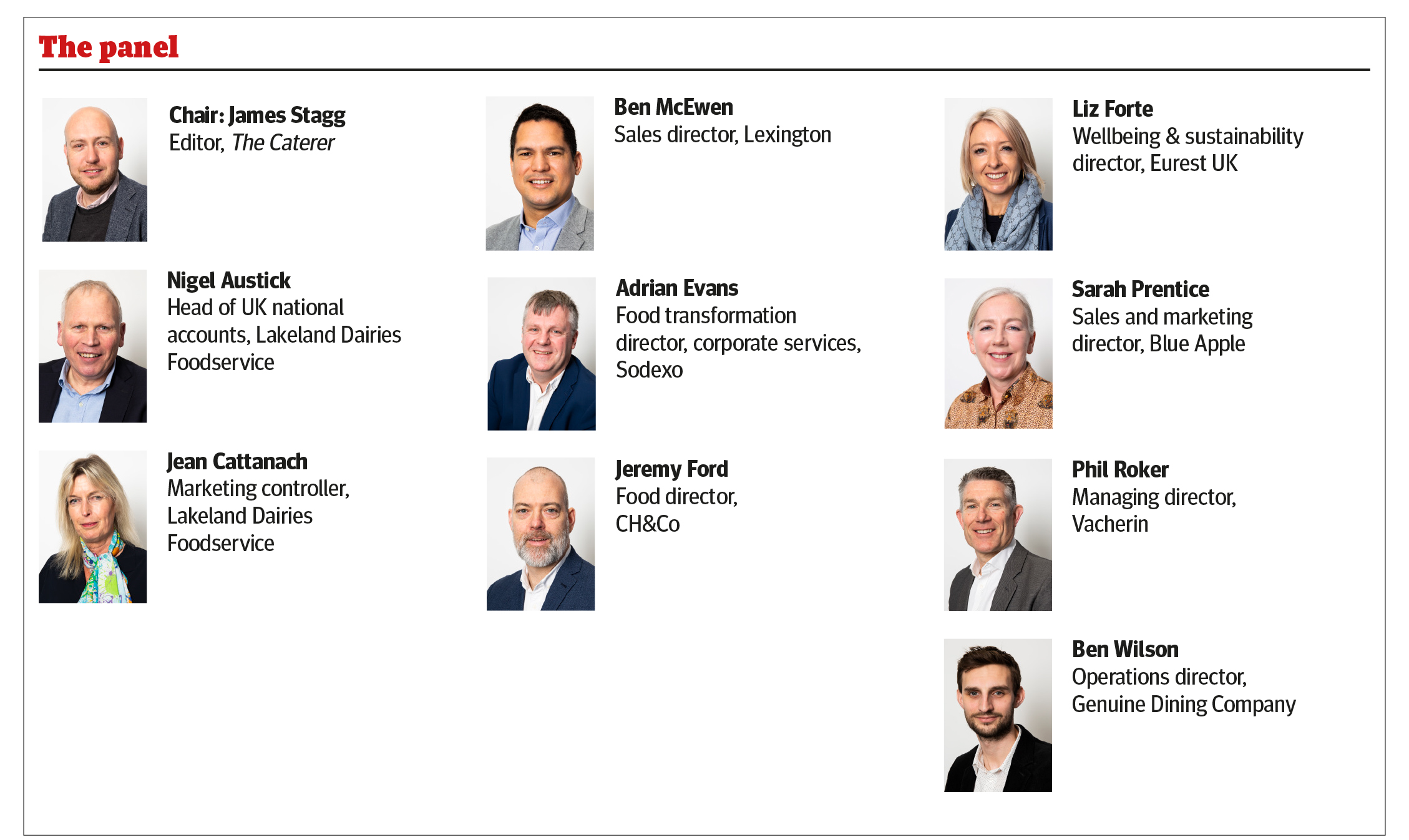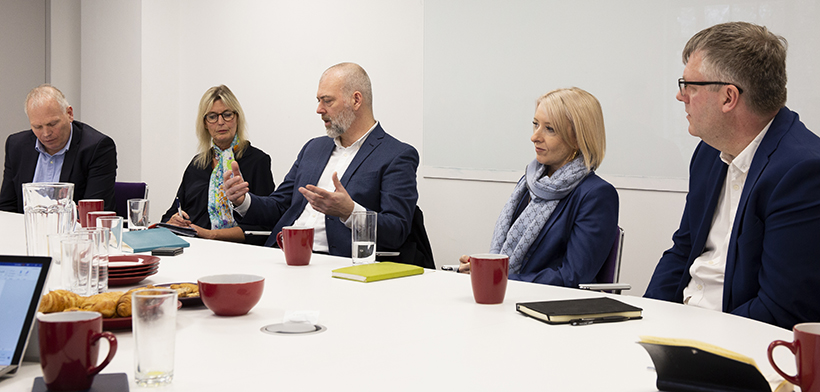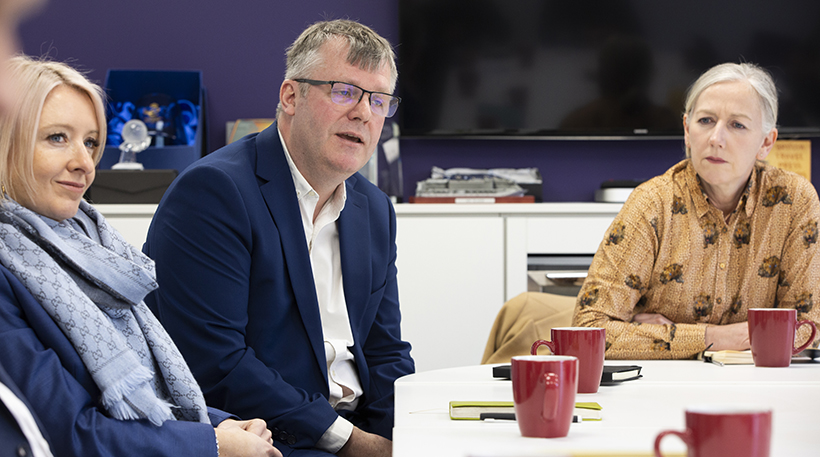Workplace catering for a hybrid workforce
Ways of working have changed after the past two years. Rosalind Mullen reports from The Caterer's round table, sponsored by Lakeland Dairies Foodservice, where experts discussed how to capitalise on trends in the workplace
What is the occupancy of London workplaces? Are employees coming back regularly now?
Phl Roker (PR): A pattern is establishing. We are seeing busy Tuesdays, Wednesdays and Thursdays, though most sites have 60%-70% of [the occupancy] we had previously. But people are spending more than they did pre-Covid because they are excited to be back. Mondays are mixed and Fridays it drops off a cliff, but they were always quiet.
Adrian Evans (AE): There is pressure to get people back into the office, but clients are still nervous around cracking the whip to say ‘you must come back'. Regional business was stable throughout Covid, especially in manufacturing. In London it was grim, but cash sales are now up because we are putting different offers in, such as speciality coffee.
Early last year it was predicted that spend would increase when workers came back and it seems this has been borne out.
Ben Wilson (BW): Clients may have fewer people in the office, but they are using out-of-hours catering in a more intensive manner. Event catering is high, with two years' worth of ‘fun budget' being used up for awards ceremonies and integrations of company culture events and so on.
AE: Consumers are also happy to pay. Previously, they wanted [the F&B offer] to be significantly cheaper than outside the workplace. Now, consumers realise the value of what we are offering.
So clients recognise the part caterers play in attracting their people back into the office?
Sarah Prentice (SP): When everyone thought there was a need to work from home, HR facilitated it. But two years on, clients now want people back in the workplace. The catering element is the engagement tool to get people back together.
AE: At the start of Covid there was talk about "the death of the office", but look around London at the investment in shiny new blocks. There is huge confidence that the capital will always be busy, and businesses will need us to service it.
Liz Forte (LF): It's not just about business sites. Boosting engagement and productivity has to be across industry sites too. They have worked throughout. A big thing we can offer is whatever they don't have at home – so pop-ups or specially squeezed juices can add value and provide a more social place where they can collaborate, rather than sit at their desk.
AE: Generation Z are coming into an industry setting and they are looking for different products, such as protein intake and juice bars, that we wouldn't usually put into industry spaces.
How have you worked with clients to attract their employees back?
LF: It's generational. Some 30% of people are now living on their own and may not be having a family meal in the evening, so your lunchtime offer is important. It is about understanding who these consumers are and not just doing what we have always done.
Jeremy Ford (JF): With many of our clients, a lot of people are coming back to work, but some are not as gregarious as they used to be. So, we collaborated with the clients and created quiet spaces for people who don't want to engage as much. They can sit and order from an app. There are so many different demographics to feed now. We are getting closer to the client's needs and offering things they never would have considered before.
AE: Progressive clients are looking at free-food programmes, though they wouldn't have looked at them before. A couple of clients said they would do it for a limited period and that has now been extended. Technology companies have done it for years and it helps them to attract and retain staff in certain areas around the globe. I think you will get more of that around London contracts.
There is also tension around inflation – organisations don't know what costs will look like, so the next six months will be interesting. We have two clients in the financial sector who are going down the free food route and who want to do it long-term. You might have thought it meant free pantry snacks or free upgraded coffee, but they are looking at it across their whole programme, which is interesting.
LF: It's about adding value for the client in terms of productivity and retention. Pre-Covid we did a study at Compass that showed workplace restaurants were the third most important perk behind, for instance, flexi-working. We offer free food at Chertsey and it has been positive. It's a fun atmosphere and people stay longer and collaborate. We have also refurbished the restaurant.
I read a Henkel study about Johnson & Johnson in the US and it worked out that for every dollar invested in F&B it got three dollars return in productivity. That is key. It is about how we unlock that return on investment.
Are there health concerns with offering free food?
AE: We are advising clients to be careful what they put into their free food programmes. If your consumers want to buy unhealthy snacks, make sure they are available. Don't be restrictive, but make the healthier choice the easiest choice.
LF: We've made it so everything in the house is on the house and anything retail is for them to buy, which helps to separate everything out. And it is not just about eating free food at your desk. People who eat together, work better together, so free food has to be eaten in a collaborative space.
What else are you doing to attract client employees back into the workplace?
JF: It is about offering an experience. We just reopened one office which has space for 300 people, but there are only 60 there at the moment. It is a stunning building, but they are struggling to bring people back in.
However, we can bring them in on certain days by creating an event with the client, who sends emails out to employees. It could be a celebrity chef. For instance, we invited Will Bowlby from Kricket restaurant, which is nearby. That communicated well and brought 150 people back into the office.
LF: It doesn't have to be out of the ordinary. If you are in an industry site, the use of ‘surprise and delight' can help you to compete against packed lunches. Even just offering speciality coffees or a pancake day can help. You just need to promote a date that your customers can look forward to.
AE: The key word is engagement. Post-Covid, a key human value shift is the need to enable the client, too. It is not just about providing food, it is about creating experiences that attract and retain the client's talent – and also attract and retain our talent. We have got to have those events because we need all our teams to get excited.
What changes has the pandemic introduced or hastened in the workplace? Have you invested more in technology?
AE: We were all going to get into technology, but Covid sped that up. Technology is only an enabler – the magic is what you do with it afterwards. It is about putting it through an algorithm to predict footfall and showing clients "this is your landscape for the next two, three or four weeks", and it is about giving that information to your operations team so they can order food correctly to reduce waste and get the right labour resources on-site.
LF: Technology gives the caterer the data to make braver, more informed decisions. For example, you can take offers out if you have the data to back that up. When it is subjective those decisions are tricky.
Is technology important to the customer?
BW: A lot of sites already had pre-ordering apps, but the pandemic taught us to use technology better, facilitating quick transactions while enabling human interaction. Coming out of the pandemic and moving forward, we find that usage rate is much higher.
SP: If staff work from home, they can look at what days they will in go in around what specials are on the menus, so it is a massive engagement tool.
JF: Ultimately, as a tool it makes it easier to order. When we introduce an app the average cheque goes up. At Sky, you can only order by app, but you still collect your food in person so you can interact with others.
PR: The app has had an impact on breakfast habits in particular. People can pre-order their coffee on their way into work and know it will be ready for them to pick up on the way to their desk. There is no need to queue at Pret, for example.
LF: The under-30s are less likely to have breakfast at home and tend to buy it on their way to work. They might go to one place for their coffee and another for their food – and that shows how important good coffee is. So, we do great coffee and a free breakfast if you arrive before 9am.
What about demand for provenance? And how important are environmental credentials?
BW: Generation Z is making bold decisions about what they are prepared to eat based on sustainability – and they won't eat a dish if doesn't hit that sustainability metric for them.
JF: It is even more important now because it is about trust. The customer wants to know that the ingredients used are sustainable and you have to communicate this in a simple way, using accreditations such as Soil Association, or Rainforest Alliance. There is the stuff you signpost and the stuff you just do. For example, at Sodexo we do WasteWatch and so use surplus vegetables in salads. We also follow the Future 50 Foods programme, in collaboration with WWF and Knorr Professional, using ingredients that are low carbon and nutritionally dense for our central menus.
LF: We have the Kitchen Promise, which means we only use in-season food. Feedback from clients shows this is affecting how people shop at home, so food plays a part in education in this net-zero climate.
AE: The next piece will be around carbon labelling. We have all been plant-forward for the last couple of years, but it did not get major traction in society until the major players got involved and it will be the same with carbon labelling. Carlsberg is working with WWF and investing in carbon offsetting. It's the start of the momentum – you know it's coming because the big players are getting involved. It's about the next generation of consumers.
Jean Cattanach (JC): Provenance runs through our DNA. Dairy farmers are our shareholders, they are on our board and they make all the decisions about our business. And they work hard – like hospitality has hard workers. We have seventh-generation farmers. Our cows are grass-fed and it is a challenge to tell that story. The sustainability piece is not straightforward story and neither is being carbon neutral.
LF: Everyone has their own provenance story, but how we tell that is important. There are a lot of issues around dairy and [operators need to give] consumers the right information so they trust us.
JC: How we market the goodness of milk needs to help people to make a balanced choice because it is a nutritionally dense product.
Challenge accepted
What has been the biggest challenge post-pandemic and how have you turned that to your advantage?
Nigel Austick (NA): The idea of eating together, which leads to working better together, has resonance. People's eating habits have changed since the lockdowns, and working from home means they have become used to eating alone. But it is important to get that interaction again.
JC: One challenge is how we bring forward the provenance and sustainability story from the dairy point of view. Dairy is being demonised, so it is a big challenge. There is a lot of misunderstanding.
JF: I think it will be uncomfortable this summer, especially in London because there are not enough chefs. We are working on exciting new openings and events, so I'm interviewing constantly, but people don't want to be a chef now or they want to do it in a different way and for more money. I get it. So many people have had time to sit at home – on a salary – and think about their lives. It is real lifestyle-change stuff.
LF: Relationships with clients have changed. Instead of expecting us to just provide a service, they are increasingly asking us for help to create a happy, productive, engaged workforce that works for them and works for us. They value our people because during the pandemic our catering staff behind the counter were only ones their employees interacted with that day.
AE: How we attract and retain more talent is a challenge. There is a crisis point today as salaries are going up, but customers only want to pay a certain amount for a certain product. We are facing food cost inflation and a labour war on talent.
SP: On the positive side, we have reshaped our service offer. We had fewer staff, so we simplified menus by removing some of the legacy dishes and improving the offer by adding provenance. But the negative side is that we are now getting busier and are struggling to ramp up the staffing levels.
BM: The ongoing challenge for us is supporting our clients through uncertainty. Some of their people still work from home, so we are coming up with solutions for hybrid delivery. We opened a central production kitchen during Covid – it's about making quick changes.
BW: Recruitment is a challenge. But to flip back 18 months, our biggest challenge was supporting the mental health of our people to encourage them back into work. For a lot of our team members English is not their first language and they have been living on their own in unfamiliar surroundings.
PR: A positive for me is the benefit of client collaboration. But a negative is that we've lost some of our chefs to other industries. It's such a waste of talent – one of our chefs reached the final of MasterChef: the Professionals, but he is now driving vans because it offers better hours.
About Lakeland Dairies
Lakeland Dairies is a global market leader in the manufacturing of dairy based products. It processes over 2 billion litres of milk per year. Its foodservice products are developed with the professional in mind, delivering high-quality, yet functional products to busy kitchens and bakeries around the world.
With a proud heritage in dairy farming, Lakeland Dairies is a 100% farmer-owned and managed Irish dairy co-operative, whose products are made from high-quality milk from the lush green pastures of its farms. Its expertise lies in technically advanced dairy products, which give the convenience of longer life products without compromising on quality. Its markets span the globe, supplying customers in more than 80 countries.
Portraits: Adrian Franklin
Main photo: Nielson Caetano-Salmeron/Unsplash
Continue reading
You need to create an account to read this article. It's free and only requires a few basic details.
Already subscribed? Log In














